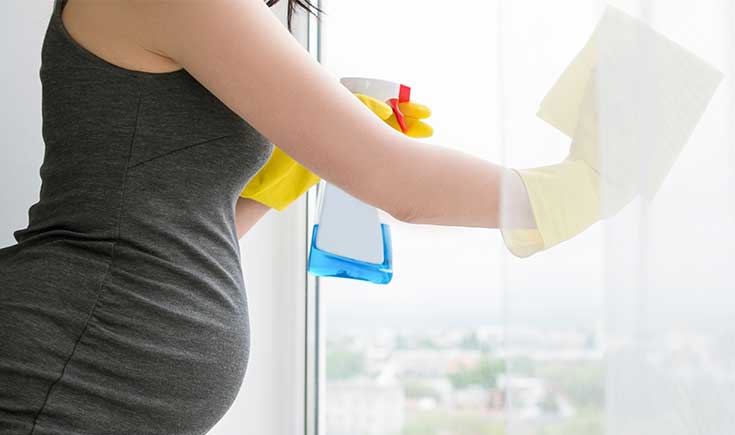

On the whole, it’s safe to use chemical products during pregnancy, but it’s always good to take some precautions. Anything possibly harmful, or ‘toxic’, to you or your growing baby is usually in small amounts so you don’t need to worry too much. However, if you’re exposed to large quantities of chemicals for a long time, your child is possibly at risk of congenital disorders or future health problems (according to Pregnancy, Birth & Baby). Because there isn’t a lot known about the effects of commonly used household products, it’s still a great idea to avoid some entirely while pregnant.
Toxic household products to avoid during pregnancy
Chemical exposure can occur in a variety of ways. If you breathe or swallow some chemicals, they can enter your bloodstream and pass to your baby via the placenta. In some cases, you can absorb it through your skin. Here are some of the toxic household products to avoid during pregnancy:
Chemical-based cleaning products
Most cleaning products are safe, but there have been reports of some products causing wheezing in early childhood. To be safe, always wear gloves when using cleaning products, and open the windows for ventilation. You might prefer to make the change to green cleaning. It’s probably best to avoid aerosols, air fresheners, and candles containing synthetic fragrances as well.
Paint
Although paint fumes are thought to be safe while pregnant, it’s best to not do any painting—so get someone else to paint the nursery while you have a mini babymoon! There’s a slightly increased risk if you use solvent-based paints, so instead use water-based paints with a paintbrush (the sprays contain solvents). Scraping and sanding of any furniture or walls is also to be avoided, as the paint could potentially be lead-based and you would be breathing it in.
Pesticides and herbicides
Some pesticides (or bug sprays) and herbicides (weed killer) are known to affect developing and newborn babies. To reduce your exposure to these chemicals, avoid them and arrange for a licensed pest professional to apply the products if necessary. With regards to personal pesticide products that are used on the skin, the amount is minimal and not considered a health risk. Use them with caution, and choose products that contain low to moderate (5-20%) concentrations of DEET (active ingredient in insect repellents).
Flame retardants
These chemicals are found everywhere, from the foam in your furniture, non-stick cookware, electronics, and carpet. Flame retardants are used to make these items less flammable, but unfortunately they have been linked to learning disabilities in children. To avoid exposure, you could try not buy products that contain these chemicals, or always keep your home well-ventilated.
How to further avoid exposure to toxic chemicals in the home
- Find alternative products if you can
- Always read and follow the instructions on the packaging
- Consider not renovating while pregnant
- Keep your home well-ventilated
- Ask for help if a job requires the use of chemicals
- Play the pregnancy card, and let other people do the work for you!
What to do if you’re exposed to chemicals
Remember that it’s only long-term exposure to large quantities that could be potentially harmful. Don’t panic if it’s a one-off exposure.
If you’re worried, call the Poisons Information Hotline in Australia on 13 11 26 24 hours a day.























